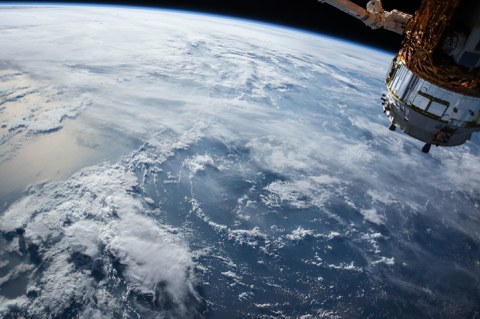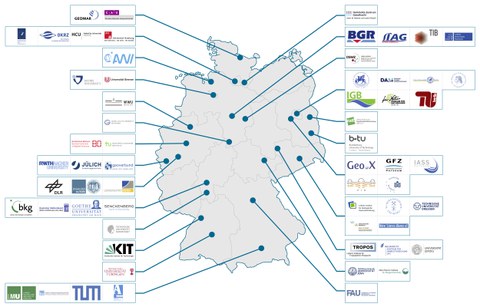02.07.2021
Nationale Forschungsdateninfrastruktur: TUD nimmt Schlüsselrolle ein
Die TU Dresden übernimmt eine herausragende Rolle in der Nationalen Forschungsdateninfrastruktur (NFDI). Mit Hilfe der NFDI sollen die Daten aus Wissenschaft und Forschung systematisch erschlossen, gesichert und zugänglich gemacht sowie international vernetzt werden. Die TUD ist nach dem jüngsten Beschluss der Gemeinsamen Wissenschaftskonferenz (GWK) an zehn von mittlerweile 19 geförderten Konsortien beteiligt. Führend koordiniert sie NFDI4Earth.
Forschungsprozesse erfolgen zunehmend und immer umfassender digital. Damit haben digitale Forschungsdaten, deren Bereitstellung und Wiederverwendbarkeit eine zentrale Bedeutung für neue wissenschaftliche Erkenntnisse und Innovationen. Mit dem 2018 beschlossenen Aufbau der Nationalen Forschungsdateninfrastruktur (NFDI) wollen Bund und Länder diese Forschungsdaten für die deutsche und internationale Wissenschaft besser und nachhaltig nutzbar machen. Die NFDI soll hierfür Standards im Datenmanagement setzen und dafür sorgen, dass Forschungsdaten gesichert und für vielfältige Zwecke weiter- und wiederverwertbar sind. In den verschiedenen NFDI-Konsortien sollen für die fächerspezifischen Bedürfnisse im Forschungsdatenmanagement gemeinsame Lösungen von Wissenschaftlerinnen und Wissenschaftlern an Universitäten und Forschungseinrichtungen in enger Kooperation mit Rechenzentren, Bibliotheken und Archiven entwickelt werden.
Insgesamt sollen 30 NFDI-Konsortien für die kommenden zehn Jahre mit rund 85 Millionen Euro pro Jahr gefördert werden. Diese werden in drei Förderrunden ausgewählt. Am 2. Juli 2021 hat die GWK die Entscheidungen für die zweite Ausschreibungsrunde getroffen und die Förderung von weiteren zehn NFDI-Konsortien beschlossen. Die TU Dresden ist an sechs dieser ausgewählten Konsortien beteiligt: NFDI4Earth, NFDI4DataScience, NFDI-MatWerk, PUNCH4NFDI, FAIRmat und Text+. Damit folgt die GWK der Empfehlung eines internationalen, wissenschaftsgeleiteten Begutachtungsprozess, koordiniert von der Deutschen Forschungsgemeinschaft (DFG).
Prof. Ursula M. Staudinger, Rektorin der TU Dresden, ist über diese Auswahl sehr erfreut: „Für die TU Dresden ist diese Auswahl ein großer Erfolg. Zählt man die vier bereits 2020 gestarteten NFDI-Konsortien NFDI4Ing, NFDI4Culture, NFDI4Chem und NFDIGHGA hinzu, ist die Universität damit an insgesamt zehn von 19 Zusammenschlüssen beteiligt und nimmt so eine Schlüsselrolle bei der nationalen und internationalen Entwicklung eines innovativen Forschungsdatenmanagements ein“.
NFDI4Earth: TU Dresden koordiniert Forschungsdatenmanagement für die Erdsystemwissenschaften
Das Konsortium NFDI4Earth ist ein wesentlicher Bestandteil der NFDI und bringt die führenden nationalen Einrichtungen der Erdsystemwissenschaften zusammen. Dazu gehören mehr als 50 Einrichtungen, unter anderen das Alfred-Wegener-Institut (Bremerhaven), das Deutsche Klimarechenzentrum (Hamburg), das Deutsche GeoForschungsZentrum (Potsdam), die Senckenberg Gesellschaft für Naturforschung, das Karlsruher Institut für Technologie, das Max-Planck-Institut für Biogeochemie (Jena), das Umweltforschungszentrum Leipzig sowie die Universitäten Leipzig, Frankfurt/Main und Hannover. Sprecher des Konsortiums für die Erdsystemwissenschaften ist Prof. Lars Bernard, Geoinformatiker und CDIO der TU Dresden. Ihm zur Seite steht unter anderen Prof. Wolfgang Nagel, Direktor des Zentrums für Informationsdienste und Hochleistungsrechnen (ZIH) der TU Dresden, als einer der Co-Sprecher.
NFDI4Earth kümmert sich um die digitalen Bedürfnisse der Forscherinnen und Forscher in den Erdsystemwissenschaften. Eine Vielzahl von Sensor- und Simulationsdaten in sehr hoher räumlicher, zeitlicher und thematischer Auflösung führt zu rasant steigenden Datenmengen. Die Beschreibung und Bewertung von Erdsystemprozessen, ihren Abhängigkeiten und Veränderungen erfordert daher dringend ein effizientes Forschungsdatenmanagement sowie leistungsfähigere Kollaborationsumgebungen für die gemeinsame, disziplinübergreifende Datenanalyse.
Prof. Bernard erläutert hierzu: „NFDI4Earth vernetzt existierende Forschungsdatenbestände, schafft einheitliche Regelungen für die Bereitstellung von qualitätsgesicherten sowie leicht integrierbaren Forschungsdaten und entwickelt gemeinsam mit der Wissenschaftscommunity – auch im internationalen Kontext – die nächste Generation von Datenaustausch- und Datenanalyseumgebungen für die Erdsystemwissenschaften. Diese Plattformen und Methoden bilden die Grundlage für innovative und interdisziplinäre Forschungsansätze, die sich auch mit den drängenden globalen Herausforderungen, wie Klimawandel, Wasserknappheit, Landnutzungsänderung, Umweltverschmutzung, Naturgefahren beschäftigen.“
Informationen für Journalisten:
Jörg Seegert
Koordinationsbüro NFDI4Earth
Professur für Geoinformatik TU Dresden
Prof. Lars Bernard
Sprecher NFDI4Earth
CDIO TU Dresden
Webseiten:
NFDI bei der DFG: https://www.dfg.de/nfdi/
NFDI4Earth: https://www.nfdi4earth.de/
PUNCH4NFDI: https://www.punch4nfdi.de/
NFDI-MatWerk: https://nfdi-matwerk.de/
FAIRmat: https://www.fair-di.eu/fairmat/fairmat_/consortium
Text+: https://www.text-plus.org/
NFDI4Ing: https://nfdi4ing.de/
NFDI4Culture: https://nfdi4culture.de/
NFDI4Chem: https://nfdi4chem.de/
NFDIGHGA: https://ghga.dkfz.de/


